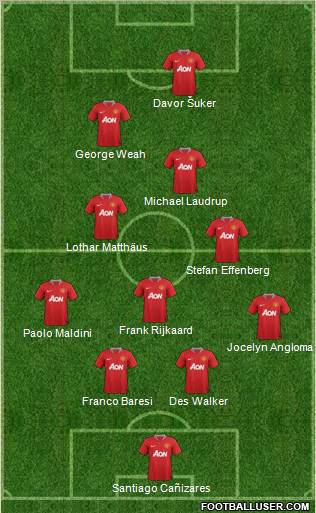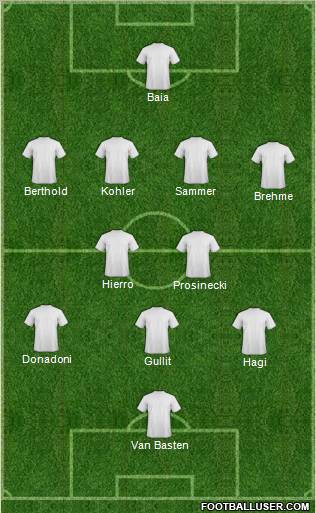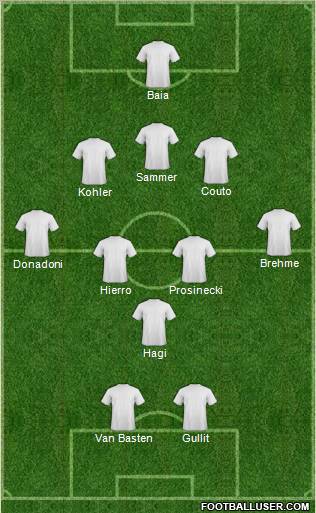Subs:
Thomas Haessler
Mauro Silva
Raí
Ronny Johnsen
Amedeo Carboni
My back four has the perfect complementary blend of footballing intelligence, defensive savviness, athleticism and technique - Paolo Maldini, Franco Baresi, Des Walker and Jocelyn Angloma. Walker will man-mark Van Basten with Baresi playing the covering role. Rijkaard is the defensive anchor, pitting him directly against Gullit. The imperious powerhouse duo of Matthäus and Effenberg function as the heartbeat and engine of the team. Effenberg will dictate proceedings from centre midfield with his vision and range of passing looking to play balls in behind for Suker and Weah to exploit the lack of pace in the opposition's centre defense. Effenberg will also check the forward runs of Brehme while Angloma focuses on Hagi. Matthaus has more freedom to bomb forward with driving runs through the centre or as a midfield runner arriving late in the box to score. Michael Laudrup is the primary creative playmaker of the team with the freedom to roam and work his magic anywhere, essentially a floating role where his superlative skills, sublime dribbling and visionary passing will string up play and orchestrate the attacking transition into the final third, supplying the devastating trio of George Weah, Davor Šuker and Matthaus to cut defenses into ribbons. Weah is given a deeper role from where he can run at the defense with his powerful dribbling at pace, attack the channels or go wide to link up with Maldini, fluid to the situations that unfold in the game. Suker will play the predatory poacher role, centre-right (hanging on Sammer's shoulder and ready to pounce on any window of opportunity) where he can cut in and shoot.
Player profiles
Santiago Cañizares
One of the top 3 goalkeepers in the world during the turn of the millenium, Cañizares represented Spain and his clubs, in particular Valencia, with great distinction, leading to acclaim from Peter Schmeichel that he was possibly the best goalkeeper in the world (
BBC Sport Academy | Football | Features | Schmeichel's top Euro keepers). A 4-time winner of the Ricardo Zamora trophy for having the best goals-conceded-to-games ratio in Spain, Cañizares has also won La Liga 4 times, the Champions league once (out of 3 finals), the UEFA Cup, the UEFA Supercup, the Copa Del Rey twice and the Spanish Supercup twice. He was also an Olympic champion with Spain in 1992.
Jocelyn Angloma
Quick, strong and defensively astute with first-rate anticipation, Angloma was one of the best right backs in the world throughout the 1990s and was chosen by European sports journalists in their Team of the Year 3 times - no mean feat considering that he was up against the likes of Cafu, Thuram and Javier Zanetti. His early career took off with Marseille with whom he won the Champions League, beating AC Milan in the 1993 final. On the international stage, he had an outstanding tournament at the European Championship in 1992, where he was chosen in the Team of the Tournament, before retiring prematurely in 1996. He ended his club career with Valencia, playing 5 seasons for them and reaching 2 consecutive Champions League finals.
Paolo Maldini
Il Capitano (the Captain), a leader of leaders and Italian Maestro who has perfected the art of defending. Possibly the most complete defender in the history of the game - technically, physically, mentally, he is the definitive finest thoroughbred there ever was, excelling in every footballing aspect from his immaculate technique to his supreme athleticism and telepathic reading of the game. A legend in the truest sense of the word, his glorious exploits with AC Milan (5 Champions League, 7 Serie A titles, 2 Intercontinental Cups) has rightfully earned him an exalted pedestal in the pantheon of footballing greats.
Franco Baresi
The greatest defender of his generation and one of the finest of all time, Franco Baresi was the defensive rock and leader of the AC Milan side which ruled world football two decades ago. His footballing intelligence was a marvel to behold - a prescient reading of the game, unmatched speed of thought and flawless decision-making, meaning that his game went beyond impeccable defensive nous as he was also a master at initiating attacks from the back. His authority in leadership and capability in organisational skills were a force-multiplier, making the defense greater than the sum of its individual parts. One of his finest performances came in the 1994 World Cup final where he shut down the Brazilian attack to the point of asphyxiation. Romário who had the quietest game of his career on the world's biggest stage called it "The most ruthless monitoring of my entire career". Chosen as Player of the Century separately by the Italian Football Federation and AC Milan (who retired his number 6 jersey in his honour), there will not be many like him in the next hundred years.
Des Walker
Circa 1990, Walker was one of the top 3 centrebacks in the world, marrying immaculate tackling prowess to searing pace and a salmon-like leap. Walker played a starring role as defensive lynchpin in England's run to the semi-finals of the World Cup in Italia 90, where his consummate man-marking skills snugly kept the world's premier strikers such as Van Basten and Klinsmann quiet in his pocket.
Frank Rijkaard
Without doubt the greatest defensive midfielder of his generation and a candidate for the finest of all time, Rijkaard would be the ideal defensive midfielder complete in every technical, physical, mental aspect if we are to construct one using a dream machine. Quite simply, he has the lot - with the pace of a Ferrari and the power of a Rolls Royce combined with his formidable tackling prowess and towering aerial strength, he is the ultimate unparalleled ball winner. What elevates him another level higher is that he is not only the best at winning the ball, he is also a master at using it - technically accomplished with exemplary ball control, polished technique and impeccable passing ability, his immaculate composure and flawless reading of the game enables him not only to retain ball possession but also immediately launch the transition into counter-attack, throwing the sucker-punch at opponents where it hurts most before they have a chance to re-group and organise. A peerless defensive midfielder who reached the acme of perfection and has not been surpassed since.
Lothar Matthäus
One of the greatest players the game has ever seen, Matthäus was a complete Tour De Force not unlike the almighty forces of Nature that can both create and destroy, a one-man Panzer army who unfailingly steamrolled all obstacles and launched pulverising attacks that ruthlessly crushed opponents into submission. This description may come as a surprise to football fans who only caught the tail-end of his career but in his prime, Matthäus was the definitive all-round midfielder who excelled at both ends of the pitch, hitting double digits in goals scored for 8 consecutive seasons, including 23 in the 90-91 season. Long-time rival Maradona described him as the best rival he ever had, a fitting testimony to a fearsome winner who captained West Germany to victory in the 1990 World Cup, scoring 4 goals in the process. Ballon D' Or winner (European Footballer of the Year) in 1990 and FIFA World Player of the Year in 1991, at his peak, Matthäus was quite simply the unstoppable Tour De Force.
Stefan Effenberg
A bona fide midfield general who commanded the pitch with Kaiser-esque authority, Effenberg's all-round ability and leadership made him the best box-to-box midfielder of his generation alongside Roy Keane. Bone-crunching tackles, pinpoint long passes, powerful driving runs and thunderbolt goals were regular features of his game. Effenberg has won numerous honours in the game but his crowning glory came in 2001 when he captained Bayern Munich to the Champions League and Intercontinental Cup titles, winning UEFA Club Footballer of the Year along the way.
Michael Laudrup
The ultimate footballing artist of supreme genius, fantasy and inspiration
What fellow professionals said of Michael Laudrup
Roberto Galia: "I have played against Maradona, Platini and Baggio. But the player I saw do the most indescribable things was Michael Laudrup."
Ronald Koeman: "Michael was possibly the most skilful and elegant player I ever played with. Few could dribble like he could. He could sense when a game was ready to be seized and transformed by a moment of individual brilliance."
Raúl González: "The best I have ever played with."
Luis Figo:"I think maybe Laudrup was the best player I ever played against."
Romário: "The best player I have ever played with and the 5th best in the history of the game"
Andres Iniesta:"Who is the best player in history? Laudrup."
Jorge Valdano:"He has eyes everywhere"
Jose Mourinho:"He was phenomenal in Barcelona. He was a fantastic player whom I would love to have on my team today."
Johan Cruyff: "When Michael plays like a dream, a magic illusion, determined to show his new team his extreme abilities, no one in the world comes anywhere near his level."
Franz Beckenbauer: "Pelé was the best in the 60s, Cruyff in the 70s, Maradona in the 80s and Laudrup in the 90s."
Davor Šuker
Flair, finesse, finishing - Šuker was absolutely top-draw and one of the premier strikers in world football during the 90s. From 92-98 his record stood at 38 goals from 44 internationals for Croatia and 114 goals from 211 appearances for Sevilla and Real Madrid. At the European Championship in 1996, he was picked in UEFA's Team of the Tournament. He moved to Real Madrid that summer and subsequently won La Liga, the Spanish Supercup, the Champions League and the Intercontinental Cup with them. He was also the Golden Boot winner at World Cup 98 in France with 6 goals, firing Croatia to 3rd place - their highest ever placing. That year, Suker was placed 2nd in the European Footballer of the Year Award and 3rd in the FIFA World Player of the Year Award.
George Weah
An athletic phenomenon and footballing Rolls Royce with a frightening blend of speed, power, control and skill, Weah was voted African Footballer of the Year, European Footballer of the Year and World Footballer of the Year in 1995. The following year, he was placed second to the Brazilian Ronaldo. Weah started his career in Europe under Arsene Wenger at Monaco before excelling at Paris St-Germain, starring in their run to the Champions League semi-final. He then moved to AC Milan and played an instrumental role in their Serie A triumphs. To this date, Weah's stupendous goal against Verona, where he started his run from inside his own box to score at the opponent's end, remains one of the best, if not the best goal scored in Serie A history.
Substitutes
Thomas Haessler
One of the best free-kick takers and greatest German midfielders of all time, Haessler was an effervescent and irrepressible pocket dynamo whose dazzling dribbles, sparkling creativity and spectacular goals bewitched countless opponents. Haessler enjoyed illustrious success with the German national side, lifting the World Cup and European Championship in 1990 and 1996. He was also the best player of the tournament at the European Championship in 1992, leading Germany to the final with a series of outstanding displays and fabulous goals. That year, he was placed third in the FIFA World Player of Year award. By the time he retired, he was only the 5th German ever to collect over a century of caps for his country.
Mauro Silva
One of the finest defensive midfielders of his generation, Mauro Silva was a Spanish Champion, a South American Champion and a World Champion, being the midfield kingpin of the Deportivo side that won La Liga (and finished runners-up in 4 other seasons) as well as an important member of the Seleção Brasileira, starting every match of Brazil's triumphant World Cup campaign in 94. While general first impressions of him are that of a tough tackler with a bottomless reservoir of stamina, observers of his game also appreciate his smooth footballing technique and flawless distribution. His best assets though are his almost telepathic reading of the game and impeccable positional sense, snuffing out smouldering danger before they have a chance to ignite. Undoubtedly a formidable rock that you could depend on in the midst of a thunderous storm.
Raí
Raí was an exceptionally gifted midfielder who was multi-faceted in his attacking talents and had a prolific goalscoring record at both club and international level. He starred for Sao Paulo, winning 2 Libertadores Cups and 1 Intercontinental Cup, before moving to Paris Saint-Germain and leading them to domestic and European success. He also won the World Cup with Brazil in 1994.
Ronny Johnsen
One of the most under-rated players in United's glorious treble success of 1999, Ronny Johnsen was a composed and pacey centreback who was equally comfortable playing in centre midfield with his sound reading of the game, fine positional sense and steady distribution. I particularly enjoyed his performances against the Brazilian Ronaldo in France 1998 and Zidane in Turin 1999.
Amedeo Carboni
A nippy left-back with four lungs, Carboni was an intelligent defender savvy in the Italian art of defending and prolific in overlapping to support the attack. In a storied career spanning 22 years, Carboni captained Roma and represented Italy at the European Championship in 1996 before moving to Valencia, winning multiple trophies including the Cup Winners Cup, UEFA Cup, and La Liga twice.



